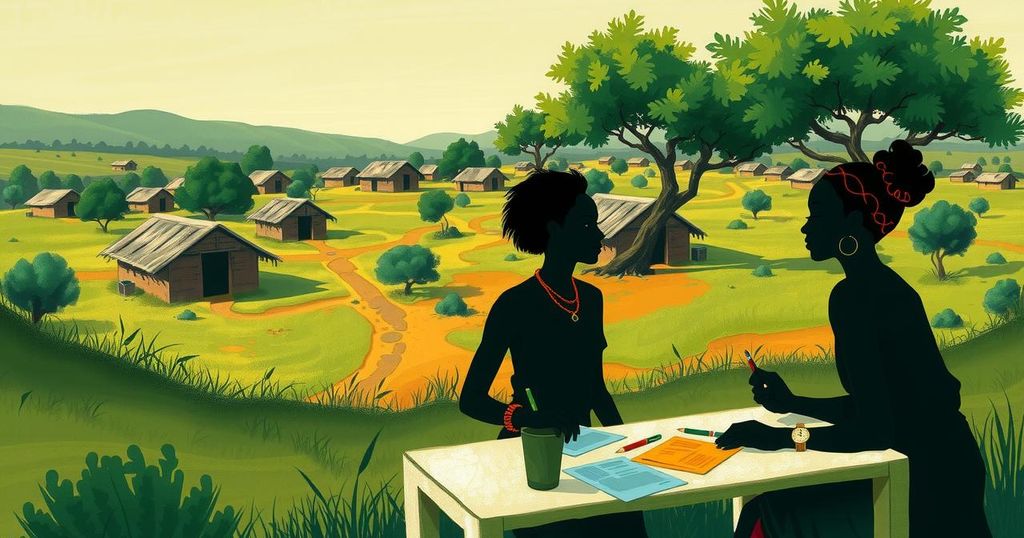Lifestyle
AFRICA, ASIA, BHAVYA JOSHI, BIXBY CENTER FOR POPULATION, HEALTH AND SUSTAINABILITY, CANADA, DEMOCRATIC REPUBLIC OF CONGO, ETHIOPIA, EUROPE, HEALTH, HEALTHCARE, HUMANITARIAN, HUMANITARIAN AID, INDIA, JOSHI, KAKUMA, KAKUMA REFUGEE CAMP, KENYA, MAGGIE ANDRESEN, MENTAL HEALTH, NAIROBI, NORTH AMERICA, REFUGEES, SOMALIA, SOUTH SUDAN, SUDAN, UC, UC BERKELEY CENTER FOR AFRICAN STUDIES, UC BERKELEY PUBLIC HEALTH, UN REFUGEE AGENCY, UNITED STATES, WHITNEY HOUSTON
Lena Nguyen
0 Comments
Enhancing Reproductive Health in Kakuma Refugee Camp: Bhavya Joshi’s Insights
Bhavya Joshi, a doctoral student at UC Berkeley, conducts groundbreaking research in Kakuma Refugee Camp to identify reproductive health needs among South Sudanese women. Her community-engaged approach has revealed significant barriers to maternal healthcare amidst compounded crises, advocating for improved support and policy changes. The research aims to empower marginalized voices while fostering sustainable health interventions in the camp.
In July, Bhavya Joshi from UC Berkeley embarked on a journey to the Kakuma Refugee Camp in northern Kenya. This camp, covering about 50 square kilometers, accommodates over 290,000 refugees from several nations, including South Sudan and Ethiopia. Established in 1992, it aims to support refugee youth affected by the Second Sudanese Civil War, and is managed by the Kenyan government alongside the UN Refugee Agency.
Joshi’s research focuses on the health challenges faced by South Sudanese women within the camp, exacerbated by armed conflict, climate-induced food insecurity, and the aftermath of the COVID-19 pandemic. Supported by UC Berkeley, her study represents one of the first attempts to capture these women’s self-identified health needs through community-based participatory research (CBPR). This approach emphasizes collaboration with local refugee women to develop research methods and tools, thereby ensuring equitable involvement in the project.
The urgency of this research is underscored by South Sudan’s alarming maternal mortality rate, the highest globally. Compounded crises lead to neglect in sexual and reproductive health amid perceived more pressing needs in humanitarian contexts. Joshi’s findings indicate significant barriers to maternal healthcare, including high rates of unreported maternal deaths, limited healthcare resources, and a lack of reproductive health services, such as cervical cancer screenings and abortion provisions.
Growing up in New Delhi, Joshi’s passion for addressing women’s health issues is deeply personal. Despite her privileged upbringing, she experienced violence, motivating her commitment to empowering marginalized women. She pursued degrees in political science and international law and has extensive experience working in health care settings for displaced populations, including migration health in Greece and reproductive care for Ukrainian refugees.
In order to ensure meaningful data collection, Joshi enlisted local women under 30 as paid data collectors, facilitating sensitive interviews in their native languages. They shared testimonials that reflect their struggles, illustrating the profound daily challenges faced by women in the camp, such as the stigma associated with menstruation and inadequate access to sanitary products.
At a workshop, Joshi presented her initial research findings to refugees and healthcare professionals, inviting critical feedback to foster community ownership of the research. Attendees expressed a desire for ongoing collaboration and highlighted the value of empowering marginalized voices within the research process.
Joshi’s discussions with the Kenya Red Cross emphasized the challenges women face regarding reproductive health. Many prioritize basic survival over healthcare, leading to covert attempts at managing reproductive health without spousal consent, which can provoke violence. Insights from male focus groups on family planning indicated potential avenues for intervention, demonstrating a need for improved education and collaborative approaches to reproductive health.
As Joshi concludes her fieldwork in Kakuma and prepares for further stakeholder meetings in Nairobi, she reflects on the powerful stories shared with her. This research aims not only to improve reproductive health services in refugee settings but also to inform policy decisions for managing compounded crises. Her work epitomizes the transformative potential of community-driven research in generating authentic solutions to pressing health issues.
In conclusion, Bhavya Joshi’s research on reproductive health in Kakuma Refugee Camp highlights the urgent need for tailored healthcare solutions for vulnerable populations. By employing a community-based participatory research approach, Joshi ensures that refugee women’s voices guide the research process. Her findings underscore the alarming maternal mortality rates in South Sudan and the barriers to healthcare accessibility. The collaborative efforts with local women aim to not only improve health services but also to enhance awareness and support for reproductive health in humanitarian settings.
Original Source: publichealth.berkeley.edu




Post Comment